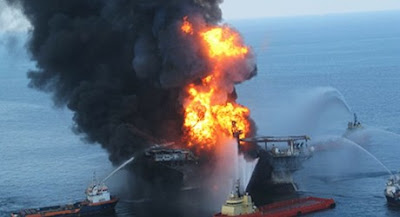Oil pollution
 |
| BP accident 2010 |
There is variety of pollution's in oceans; oil
pollution is one major among them. Some of the disaster such as “Exxon Valdez” incident in Prince William Sound, Alaska, 1993, braer,
Off the Shetland Islands, 2010 BP leak in
the Gulf of Mexico made people concern and
aware about oil pollution. The
pollutant is crude oil; oil pollution is caused due to accidents of oil tankers,
explosion in offshore oil production rigs. The oil spills brings undesirable
changes in water quality and marine flora & fauna.
The oil mixes with water to form a substance
called “mousse” which sticks on feathers of coastal birds and furs of marine
mammals such as pinnipeds. Feathers and
furs are filled with air spaces to help in maintaining the body temperature by
insulation. These oil spills fills the gap, make no way for the air spaces to
insulate the body. Hence, coastal birds and marine mammals (Pinnipeds) die as a
result of “hypothermia”. Oil slicks are also carried away to sandy & rocky shore
by the tides and the waves. The grazers and filter feeders of these
environments are affected heavily due to oil pollution.
Organ damage of marine fauna
Oil spills damage the eyesight of the marine animals
and blind them .Hence, chance of being prey for predators is high. Uptake of oil spills by marine organisms
damages the internal organ such as lungs, kidneys, digestive tract by formation
of ulcer, diseases etc. Marine mammals such as dolphins, whales frequently
comes to surface for breathing using blowholes. Oil spills sticks to the
blowholes of these animals and blocks the way for breathing, it leads to mortality.
Oil spills also affect normal food chain of ocean by affecting primary producers
such as phytoplankton and zooplanktons. All the above factors have ability to
bring the name of the animal in endangered list for some period. After,
destroying the surface or necktonic animals the oil seeps down to the bottom and
also affects the benthic fauna such as crabs, shrimps on the sea floor.
Impacts
on marine flora
Mangroves are sensitive to oil spills. Oil slicks
carried out by tides and waves to mangrove environment coats the roots such as aerial
root (pneumatophores) of mangroves such as Avicennia. It affects the oxygen
exchange and salt excretion process of such mangrove. Lighter oil slicks are
more penetrable than the heavier oil slicks into mangrove forest. Sea water
soluble fraction (SWSF) of oil is a kind of dissolved or suspended tiny spills
of oils. Toxic bits from this SWSF passes through the blades of sea grass and
accumulates on chloroplasts interrupts the photosynthesis activity.
Acknowledgement : Pictures were collected from following links


.jpg)



Something needs to be done. ...good job ! umer
ReplyDeleteyeah we need to protect our ocean and its resources. Thanks man.
ReplyDelete